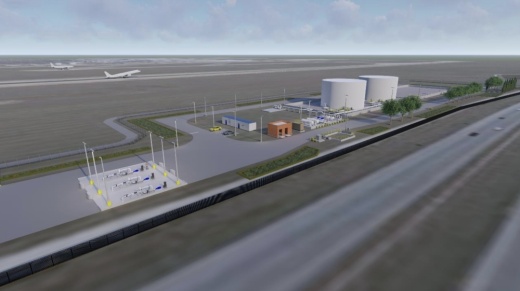The airport is already contending with operational issues related to its growth and increasing travel in and out of Austin. To serve rising demand, aviation officials say more on-site jet fuel capacity is needed. The airport also said it currently only has two to three days of fuel available at any given time—most airports have up to one week's worth—and that limited fuel situations could become more common without expanded facilities.
"We expect fuel shortage alerts will be issued with more regularity so long as demand outpaces supply," public information officer Sam Haynes said in an email.
ABIA for years has planned to place a new Jet-A fuel facility on the airport's western edge off US 183 to serve its growing needs, although the project did not draw much public input or attention when it was first proposed. That changed late last year when a measure from District 2 Council Member Vanessa Fuentes paused the fuel site's development to allow for further neighborhood conversations about the plan.
Fuel farm concerns
In the months since, Fuentes and East Austin residents have raised concerns about the airport's lack of public engagement on the topic as well as the possible environmental and health risks associated with a new fuel center. Given that the proposed site is several hundred feet from existing homes and businesses, community members have also noted similarities to the former east side toxic tank farm and the negative outcomes the facility brought to its surrounding area.
“We don't have to go too far back in our city’s history to see environmental racism at play in the city that we all adore. ... It took 15 years to clean up and countless families were affected with high rates of cancer and poorer health outcomes," Fuentes said during an April 5 council work session. "The mistrust in local government has only gotten bigger. And so we have a choice to make this week: Will we allow our east side families to be continued to be subjected to air pollutants, or will we want to ensure the health and safety of our community?”
The site's federal environmental review submitted two years ago found the jet fuel project would cause "no significant adverse impacts" near ABIA, according to John MacFarlane, an environmental protection specialist with the Federal Aviation Administration. However, officials said that finding came through a National Environmental Policy Act process that was loosened under former President Donald Trump and could have some requirements added back in the near future under President Joe Biden.
Austin airport, fire department and FAA representatives also said the fuel site's current plan features several safety features that would mitigate possible accidents there. Additionally, they said the Jet-A fuel to be used at the site is generally safer to store than other gas options. Officials also noted that, while located on the city-owned airport property, many details of the fuel site's management are left up to a consortium of airlines rather than ABIA itself.
On April 7, council will consider a resolution from Fuentes that would halt the airport's development process and reopen site selection and community engagement for a new fuel storage facility. Whether the measure will pass remains to be seen, but Mayor Steve Adler said airport and city officials should consider taking further action—up to possible home buyouts—regardless of the Thursday vote.
"Even if it is safe, I think we need to recognize the existing perception and anxiety about safety in part born of a very real experience that occurred over in East Austin," Adler said. "If it’s unsafe, then I think we need to move the location or we need to buy out people that would otherwise be in an unsafe place. ... If it’s safe, but the perception exists, I think we do need to consider a voluntary buyout program."
After the airport initially moved the project along without much scrutiny, Fuentes said council must now weigh a possible delay to the airport's redevelopment against the needs of area residents.
“This is when we have to make tough decisions as policymakers," she said. "What we heard today was a pretty outstanding economic impact this would have to our airport expansion and operations. But equally as important is the human impact that this would have."





